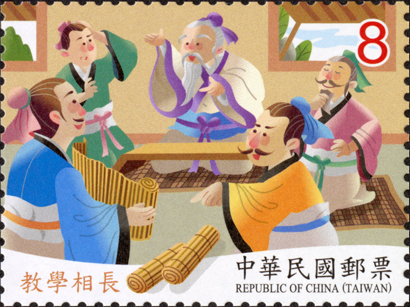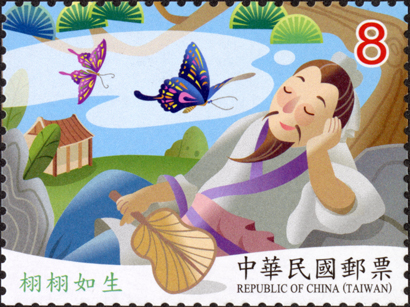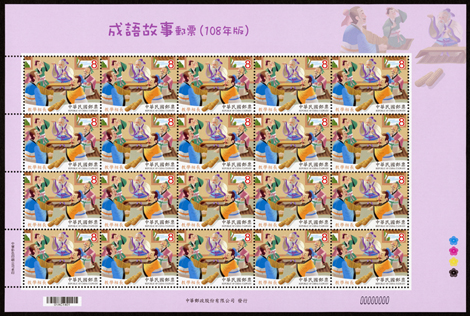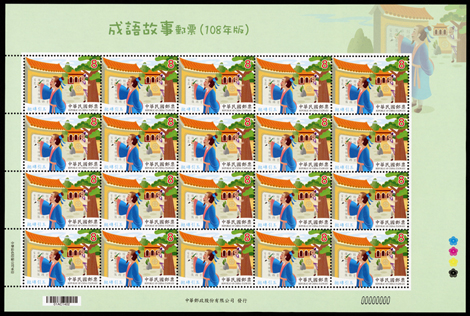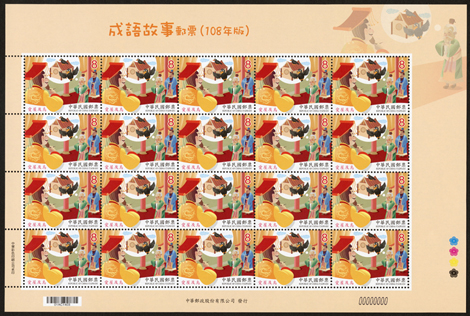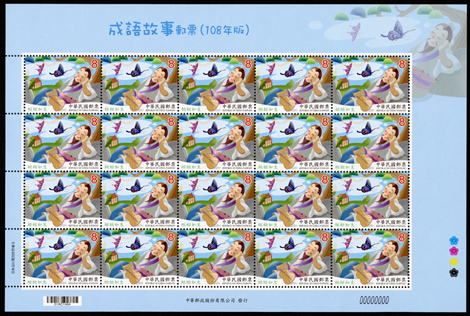Sp.675 Chinese Idiom Stories Postage Stamps (Issue of 2019)
| Stamp SN | D675 |
| Stamp Name | Sp.675 Chinese Idiom Stories Postage Stamps (Issue of 2019) |
| Stamp Cat Standard | Special Stamps |
| Stamp Cat | Tales, Literature, Literature |
| Issue date | 2019-03-20 |
| Suspersion date | |
| Dimension of stamps(mm.) | 40 × 30 (mm) |
| Size of souvenir Sheet (mm.) | |
| Printer | China Color Printing Co., Ltd. |
| Drawer | |
| Designer | Tseng Kai-chih |
| Photographer | |
| Engraver | |
| Creative Director | |
| Sheet composition | 20 (5 × 4) |
| Print color | Colorful |
| Process | Offset |
| Paper | Phosphorescent stamp paper |
| Back | |
| Perforation | 12½ |
Description
Having released issues of Chinese Idiom Stories Postage Stamps in 2015 and 2017, Chunghwa Post is following up with a new set of four stamps, which feature the following idioms: “Education benefits both students and teachers,”“offering bricks to elicit jade,” “love house and crow,” and “true to life.” Descriptions of the stamps and their designs follow:
1. Education Benefits Both Students and Teachers (NT$8): It is written in the “Record on the Subject of Education” from The Book of Rites that the roles of teachers and students support each other. Teachers seek to advance and replenish their own knowledge as they teach. Meanwhile, students gain knowledge from their teachers, but they must be diligent if they are to refine their understanding. This expression is used to express the idea that teaching and studying advance the students’ understanding while also elevating the teachers.
2. Offering Bricks to Elicit Jade (NT$8): When the Tang dynasty poet Chang Jian learned that Zhao Gu was going to the Lingyan Temple in Suzhou, he wrote on the temple wall: “At this old temple beside the Guanwa Palace / The clouds over the watery expanses are many, and the visitors few.” His expectation was that Zhao would add the final two lines to the poem. Zhao did indeed add: “Upon hearing of spring’s arrival, my melancholy doubles / Amid hundreds of blooms, a monk returns.” Later generations felt that Chang Jian had “offered bricks to elicit jade”—and the expression came to describe the act of offering clumsy lines of poetry or unpolished efforts in the hope of eliciting outstanding work from another person.
3. Love House and Crow (NT$8): At the end of the Shang dynasty, after King Wu defeated King Zhou in Muye, he called his ministers together to discuss how to treat the conquered Shang people. Jiang Taigong said that he had heard that if you love a person, you love even the crow that perch on the roof of your beloved’s house, whereas if you hate someone, you hate even the fence around their home. The phrase “love house and crow” would thenceforth come to mean that when you truly love someone, you love everything connected to them. In general spirit, the phrase is akin to the English expression: “Love me, love my dog.”
4. True to Life (NT$8): Chuangzi was a thinker of the Warring States era. He once dreamt that he was a butterfly, flitting hither and thither. He completely forgot he was a person. Yet when he awoke, he found that he was still Chuangzi. The vividness of the butterfly made Chuangzi remark upon how true to life his dream was. He wondered: Am I a person who has awoken from a dream that I was a butterfly, or a butterfly dreaming that I am a person? Chuangzi’s phrase is now commonly used to describe something that is extremely vivid and lifelike.
To promote teenagers’ knowledge of folk rhymes and classic toys and Chinese idiom stories, this Post is issuing a pictorial with Children’s Folk Rhymes Postage Stamps (Continued), 2 sets of Children at Play Postage Stamps, 3 sets of Chinese Idiom Stories Postage Stamps and “The Snipe and the Clam Are at a Deadlock” stamp of the Chinese Fables Postage Stamps. Its design includes vivid and colorful illustration loved by younger generations. It’s worth collecting.
By-issues
(2) Folder (with or without mount): NT$5 apiece
(3) Loose-leaf album page: NT$8 apiece
(4) Pre-cancelled FDC affixed with one NT$8-denominated stamp: NT$10 apiece
(5) Pre-cancelled FDC affixed with a complete set of stamps: NT$34 apiece
(6) Stamp pictorial: NT$380 a copy
To purchase the relative philatelic products, please go directly to the post office branches, or order on line at https://stamp.post.gov.tw .
